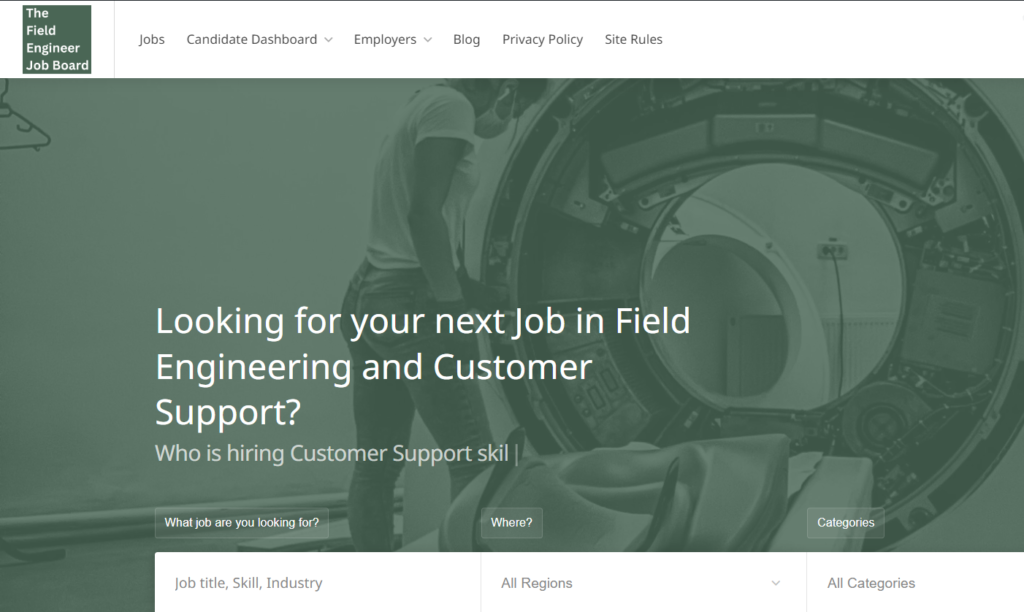Do you find Hiring Field Service Engineers easy?
If you answered yes, you are probably using similar strategies when hiring field service engineers to what we outline below.
Across industries and in all countries, more field engineers are needed.
A shortage of Field Engineers loads pressure on existing team members.
In industries where there is a shortage of field engineers, projects are delayed, and equipment remains unusable while waiting to be repaired.


How to build field engineering teams with successful recruitment
Field Engineering recruitment and hiring field service engineers
If you are recruiting for a well-known global company. If it is one that people want to work for, hiring experienced engineers from competitors has always been the easy option. This may be an attractive strategy.
The downside is that engineers who switch jobs to get a better salary, are likely to switch jobs again. This may happen when one of your competitors offers them an even higher salary.
Secondly, this does not grow the pool of talent already in your organisation. In addition, it leads inevitably to a shortage of new talent coming through the ranks. As well, it can also block the progress of your current employees.
Widening the net when hiring field service engineers
If you are a team leader or in a team which is under resourced, you are probably working long hours and don’t feel that you have time to change your recruitment strategy. However, you don’t have to spend much time to make significant changes to the process.
It is a truism, but there are the people out there who are good fits for your roles. You just need to find them, or they need to find you. The first thing to do is to widen your net.
How can you do this? There are five ways to consider.
Number One – Geographical


If in the past, you have perhaps just considered local candidates. This has probably led to local candidates being the only ones to apply. You now need to look wider. Consider the following four strategies.
Looking further away in terms of your advertising.
Offering assistance with relocation.
Encouraging people from neighbouring countries to apply (if applicable).
Sponsoring work permits and visas if this is possible.
Number Two – Cut the list of skills


Some job descriptions read like a wish list.
This may be because the hiring manager has a perfect candidate in mind.
Or it may be because the job description:
has been added to over time or
different people have added parts based on their understanding of the role.
A good exercise is to take time to read though your job description. Then decide if you yourself have all the skills asked for!
Then take anything out which is not vital.
Ask yourself, are there any of the skills needed for the job which you could offer training for instead?
For example, perhaps someone doesn’t have the necessary level of language. Could you send them on an intensive two-week course followed by regular weekly lessons. There would be a cost with this, but if they are a fit in other ways, it would be offset.
This would work for programming languages too. If someone hasn’t used Python, for example. Could you offer them the chance to learn supported by the company? Again, there is a cost, but it might mean you have an ideal candidate at the end of the course or training. As a side benefit, there will already be a sense of loyalty from your new hire from day one of starting to work for you.
If someone hasn’t worked with the equipment, software or systems you use, look at aptitude. Could they learn quickly? Do they have the basic skills, interests and techniques.
Number Three – Promote from within
This requires out of the box thinking. Is there someone working within the organisation already who could do the job? They already know the company, the processes, the people and the industry. You won’t have to attract them, hire them, relocate them, or compete with other job offers being made. So, walk around the building, or read through the employee list. Assume that there is at least one person there, who could fit into your team, and then find them.
Number Four – Attract from outside your industry


Advertise in different and possibly unusual places. Your current staff may be able to make some suggestions.
Check your job descriptions for language that could be making people rule themselves out. You can check your job description with a gender decoder.
Don’t list too many very specific skills unless they are vital. Instead, are there skills which would make a good substitute or suggest that someone could learn what you need quickly?
If you usually look for full time people, consider part time, remote, or hybrid working. It may open a whole new seam of candidates.
Work out what are the transferable skills for your industry and your job vacancies.
Number Five – Consider other groups
Are there some people that your organisation has never hired? Are there groups of people who have never applied to you?
For example, there could be potential in these groups.
People who have taken early retirement.
Service personnel leaving the military
People who have left one career and want something different on a part time basis.
The funnel when hiring field service engineers


So, your net has been spread widely and you now have a pool of candidates to consider. Think of the next process as a funnel.
For example, if you have:
100 applications,
10 will be interviewed,
Then 1 selected.
Of course, if you are very lucky:
1 application
1 interview
Then 1 selected.
Or, even luckier:
100 applications
100 interviews
Then 100 selected.
The numbers will vary depending on the role and the industry – and your specific company.
They are all going to be there at the start. Who or what is going to select the initial list.
Who – is it one person for the initial filter or a team?
What – do you use software or AI (Artificial Intelligence) to filter?
This is a key stage. You don’t want to lose anyone at this early stage who could potentially be the one you hire.
So, think about the following issues.
Bias, both conscious and unconscious
Try reviewing CVs/Resumes without name, education, current company and see if your decisions are different.
Assumptions about work permits
Don’t assume someone’s nationality eliminates them. Perhaps they have a spouse, dependent or ancestry visa.
Consider other ways of filtering. Can you:
Use an aptitude test
Ask for samples of work
Ask about hobbies.
If you keep as many people as possible in your funnel, you may end up filling more than one role.
Profile of a field engineer


To target the right pool of possible talent we need to agree on what skills make a good field engineer.
Most team leaders agree that the type of person and their aptitude and attitude is much more important than existing technical skills alone. So, with our encouragement lots of hiring managers have started looking for a type of person rather than a tick box list of specific skills and knowledge.
This type of recruitment can also mean that it is easier to switch industries/sectors as a field engineer.
So, specific technical skills and knowledge aside, what should you look for to find an excellent field engineer?
What makes a star field engineer?
Think of someone you know (or perhaps yourself) who stands out as being a star engineer. Then, check how many of the following apply.
Communication skills
Ability to communicate clearly with both colleagues and clients
Strong listening and customer service skills
Able to show respect and empathy as part of communication
Ability to simplify and explain technical data for non-technical clients or colleagues
Hands-on
Hands on skills – maybe as a hobby interest
Dexterous
Physically fit with good stamina
IT
Knowledge of computer software and hardware
Up-to-date IT skills
Ability to generate fast, accurate and informative paperwork/reports on the relevant system
Thought processes
Problem-solving abilities including ‘out of the box’ thinking
Capable of analytical thinking
Very technical way of thinking
Detail
Strong organisational skills even when working entirely alone
Attention to detail from the beginning of a customer visit to the end
Excellent time management skills
Ability to multitask but to appear calm while doing it
Easily able to follow detailed plans and instructions
Happy to follow procedures consistently but also to think of ways to feedback about improvements
Health and Safety
Understanding of why health and safety is important in any job
Quick to learn the health and safety policy on any new site visit
Desire to improve health and safety on every site visit and for other colleagues
Potential
Interest in technology and innovations and happy to keep up with current trends
Knowledge of other languages – even if only basic
Keen to develop new skills
Personality
A sense of humour
Calm and methodical when overcoming difficulties
Likes solving problems
A desire to delight customers
A people person
Pool of candidates for future hiring of field service engineers


Keep in touch with applicants who may not be right now but could be in the future.
It is a mistake to not respond to all job applicants, even if it is only to tell them their application is not successful.
Depending on where you are located, and your own company’s policies, as a hiring manager it can make sense to keep in touch with candidates who did not make the shortlist or did not get the job this time. However, you see in them a potential future hire.
You can get their permission to be on your company mailing list or have your own mailing list where you check in every six months to see how they are doing. Maybe meet up with them at a trade show for a coffee.
When you are next hiring, you can have a potential pool of interested candidates ready for the next opportunity.
How can The Field Engineer help with hiring field service engineers?
The Field Engineer has been created to provide a resource to support people who want to become Field Engineers, as well as those who don’t yet know that they want to become Field Engineers.
We are providing resources, learning tools, and have created a dedicated Job Board for companies who recruit Field Engineers to connect to job seekers with job offers.
This is the reason for having dedicated The Field Engineer Job Board a click away from our community website.
We are supporting companies who want to hire Field based Engineers and working with them in offering relevant resources to raise the profile of these careers, and jobs available in them.
We are engaging with engineers and making engineers working in other sectors and job roles aware of the opportunities available in Field Engineering.
In other words, our community and wider network is strengthening and growing connections within the existing pool of talented Field based Engineers in three keyways.
Connecting them with the people who want to hire them.
Increasing the pool of available talent that is aware of the opportunities in Field Engineering through networking and outreach.
Supporting and encouraging companies to improve the training they offer, such as apprenticeships, internships, outreach to universities and colleges, and internal recruitment within their own employees.


Further reading about hiring field service engineers
How to build successful global technical field support teams


Responses